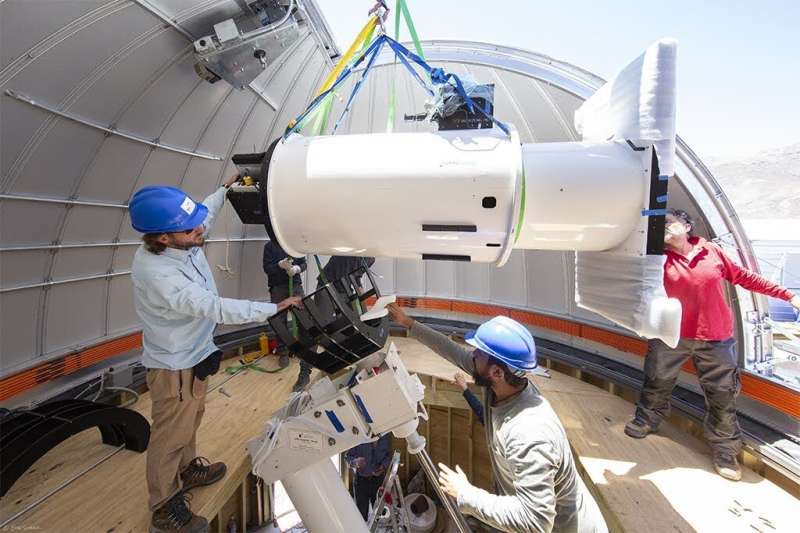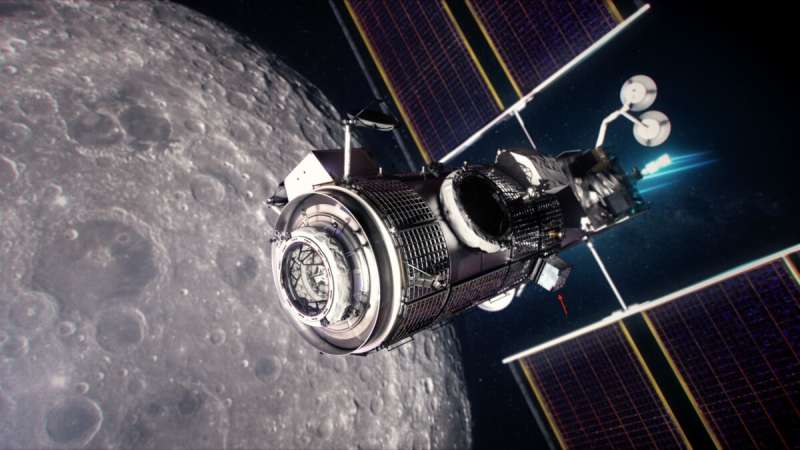
Copernical Team
Extreme exoplanet has a complex and exotic atmosphere
 An international team including researchers from the University of Bern and the University of Geneva as well as the National Centre of Competence in Research (NCCR) PlanetS analyzed the atmosphere of one of the most extreme known planets in great detail. The results from this hot, Jupiter-like planet that was first characterized with the help of the CHEOPS space
An international team including researchers from the University of Bern and the University of Geneva as well as the National Centre of Competence in Research (NCCR) PlanetS analyzed the atmosphere of one of the most extreme known planets in great detail. The results from this hot, Jupiter-like planet that was first characterized with the help of the CHEOPS space Extremely harsh volcanic lake shows how life might have existed on Mars
 A few specialist microbes survive conditions analogous to those of Mars' early history, reports a new publication in Frontiers in Astronomy and Space Science-and this may be thanks to a broad range of adaptations.
The hydrothermal crater lake of the Poas volcano in Costa Rica is one of the most hostile habitats on the planet. The water is ultra-acidic, full of toxic metals and the temperat
A few specialist microbes survive conditions analogous to those of Mars' early history, reports a new publication in Frontiers in Astronomy and Space Science-and this may be thanks to a broad range of adaptations.
The hydrothermal crater lake of the Poas volcano in Costa Rica is one of the most hostile habitats on the planet. The water is ultra-acidic, full of toxic metals and the temperat China, Russia to start building lunar research station by 2026
 China said Friday that it expects to sign a space agreement with Russia by the end of this year that will include construction of a joint lunar research facility.
"We are intensively engaged in negotiations and have basically reached a consensus. The agreement is quite possible to be signed as soon as possible this year," China National Space Administration Vice Administrator Wu Yanhua
China said Friday that it expects to sign a space agreement with Russia by the end of this year that will include construction of a joint lunar research facility.
"We are intensively engaged in negotiations and have basically reached a consensus. The agreement is quite possible to be signed as soon as possible this year," China National Space Administration Vice Administrator Wu Yanhua Skyroot Aerospace to fly its rocket from mobile launch pad in 2022
 Rocket maker Skyroot Aerospace Private Ltd's Vikram-1 rocket is slated to lift off from a mobile launch pad or transporter, erector and launcher (TEL), a top company official said.
The Hyderabad-based company is planning to test launch its rocket with a couple of satellites by the end of this year, he added.
"Our maiden rocket launch will be with a couple of satellites from a mobile launc
Rocket maker Skyroot Aerospace Private Ltd's Vikram-1 rocket is slated to lift off from a mobile launch pad or transporter, erector and launcher (TEL), a top company official said.
The Hyderabad-based company is planning to test launch its rocket with a couple of satellites by the end of this year, he added.
"Our maiden rocket launch will be with a couple of satellites from a mobile launc Astra Awarded VADR Contract by NASA
 Astra Space, Inc. has been awarded of the Venture-Class Acquisition of Dedicated and Rideshare (VADR) Launch Services Indefinite Delivery/Indefinite Quantity (IDIQ) contract from the National Aeronautics and Space Administration (NASA) for future task orders, which have not yet been issued.
This contract has a five-year ordering period with a maximum total value of $300 million and will be
Astra Space, Inc. has been awarded of the Venture-Class Acquisition of Dedicated and Rideshare (VADR) Launch Services Indefinite Delivery/Indefinite Quantity (IDIQ) contract from the National Aeronautics and Space Administration (NASA) for future task orders, which have not yet been issued.
This contract has a five-year ordering period with a maximum total value of $300 million and will be Rocket Lab to provide Venture Class Launch Services for NASA
 Rocket Lab has been selected by NASA as one of twelve companies to provide launch services for the agency's Venture-Class Acquisition of Dedicated and Rideshare (VADR) missions, providing new opportunities for science and technology payloads and fostering a growing U.S. commercial launch market. VADR is a five-year program with a maximum total budget for $300 million in launch contracts.
R
Rocket Lab has been selected by NASA as one of twelve companies to provide launch services for the agency's Venture-Class Acquisition of Dedicated and Rideshare (VADR) missions, providing new opportunities for science and technology payloads and fostering a growing U.S. commercial launch market. VADR is a five-year program with a maximum total budget for $300 million in launch contracts.
R China Focus: China to explore lunar polar regions, mulling human landing: white paper
 China will explore the moon's polar regions and is mulling over a manned lunar landing in the coming five years, according to a white paper released on Friday.
The white paper, titled "China's Space Program: A 2021 Perspective," said China will continue its studies and research "on the plan for a human lunar landing."
A new-generation manned spacecraft will be developed to support it
China will explore the moon's polar regions and is mulling over a manned lunar landing in the coming five years, according to a white paper released on Friday.
The white paper, titled "China's Space Program: A 2021 Perspective," said China will continue its studies and research "on the plan for a human lunar landing."
A new-generation manned spacecraft will be developed to support it Expanded UH asteroid tracking system can monitor entire sky

A state-of-the-art asteroid alert system operated by the University of Hawaiʻi Institute for Astronomy (IfA) can now scan the entire dark sky every 24 hours for dangerous bodies that could plummet toward Earth.
The NASA-funded Asteroid Terrestrial-impact Last Alert System (ATLAS) has expanded its reach to the southern hemisphere, from two existing northern-hemisphere telescopes on Haleakalā and Maunaloa. Construction is now complete and operations are underway on two additional telescopes in South Africa and Chile.
"An asteroid that hits the Earth can come at any time from any direction, so ATLAS is now all the sky, all the time," said John Tonry, IfA professor and ATLAS principal investigator.
The new telescopes are located at Sutherland Observing Station in South Africa and El Sauce Observatory in Chile. These locations were selected not only for their access to the southern part of the sky but also their time difference from Hawaiʻi—they are able to observe at night when it is daytime in Hawaiʻi.
SpaceX again scrubs launch of Italian satellite
 SpaceX again scrubbed its launch of an Italian Earth-observation satellite, the COSMO-SkyMed Second Generation 2, on Friday.
The aerospace company ran into weather problems for a second day in a row.
"Standing down from today's launch of COSMO-SkyMed Second Generation FM2 due to poor weather conditions at the launch site tonight; next opportunity is tomorrow, January 29 at 6:11 p.m.
SpaceX again scrubbed its launch of an Italian Earth-observation satellite, the COSMO-SkyMed Second Generation 2, on Friday.
The aerospace company ran into weather problems for a second day in a row.
"Standing down from today's launch of COSMO-SkyMed Second Generation FM2 due to poor weather conditions at the launch site tonight; next opportunity is tomorrow, January 29 at 6:11 p.m. NASA's HERMES mission passes key milestone, moves toward launch

NASA's HERMES mission—a four-instrument suite to be mounted outside NASA's Moon-orbiting Gateway—has passed a critical mission review on Jan.
































